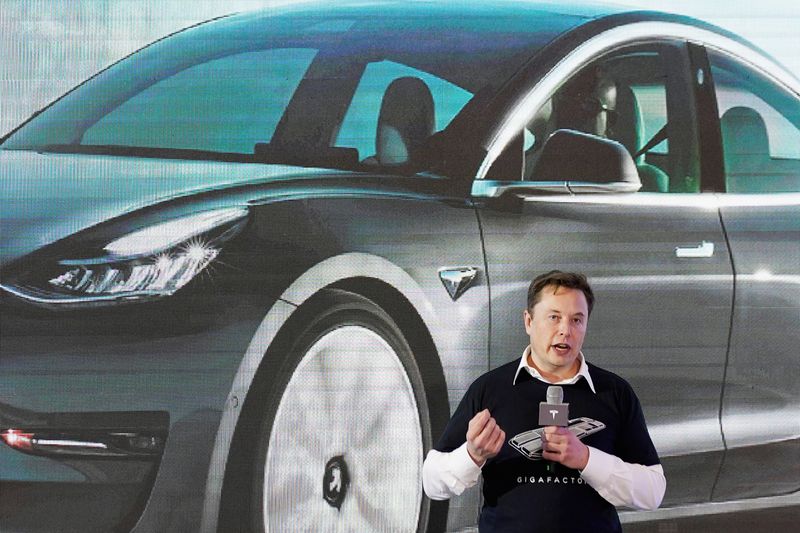By Tina Bellon
(Reuters) - Tesla Inc (O:TSLA) CEO Elon Musk fired up fans and investors for the company's "Battery Day" on Tuesday, even as he tempered expectations that Tesla's electric vehicles will soon surpass the cost and convenience of traditional gasoline-powered cars.
At the opening of the event, which drew nearly 250,000 online viewers, Musk walked on stage in a black t-shirt and jeans as about 250 shareholders -- each sitting in a Tesla Model 3 in the company parking lot -- honked their car horns in approval.
Ahead of the event, Tesla shares closed on Tuesday at $424.23, down 5.6% after Musk tweeted late Monday that the battery improvements to be unveiled at the event would not reach "serious high-volume production" until 2022. Shares rose 1.5% in after-hours trade.
As automakers shift from horsepower to kilowatts to comply with stricter environmental regulations, investors are looking for evidence that Tesla can increase its lead in electrification technology over legacy automakers who generate most of their sales and profits from combustion-engine vehicles.
Analysts expect Tesla to present a range of updates, including significant improvements to the amount of energy its batteries can store, allowing vehicles to drive further on a single charge. They also await updates on the production cost of battery cells, largely seen as an impediment to wider electric vehicle adoption.
Musk in July said scaling battery cell production at an affordable price was Tesla's biggest limitation to growth.
While average electric vehicle prices have decreased in recent years thanks to changes in battery composition, they are still more expensive than conventional cars, with the battery estimated to make up a quarter to a third of an electric vehicle's cost.
Some researchers estimate that price parity, or the point at which electric vehicles are equal in value to internal combustion cars, is reached when battery packs cost $100 per kilowatt hour (kWh).
Tesla's battery packs cost $156 per kWh in 2019, according to electric vehicle consulting firm Cairn Energy (OTC:CRNCY) Research Advisors, which would put the cost of a 90-kWh pack at around $14,000.
Analysts at UBS expect Tesla to announce battery cell costs of $70 to $80 per kWh over the next three years, allowing the company to save roughly $2,300 per vehicle.
Such a price advantage would leave competitors unlikely to catch up to Tesla, the UBS analysts said.
Tesla currently produces batteries in partnership with Japan's Panasonic Corp (T:6752) at its $5 billion Nevada factory, while South Korea's LG Chem (KS:051910) and China's CATL (SZ:300750) supply cells to its Shanghai factory.
Tesla is also building its own cell manufacturing facility at its new factory in Germany and is setting up a battery research and manufacturing facility at its largest vehicle factory in Fremont, California.

Musk in July also said Tesla was open to license and supply powertrains and batteries to other automakers.